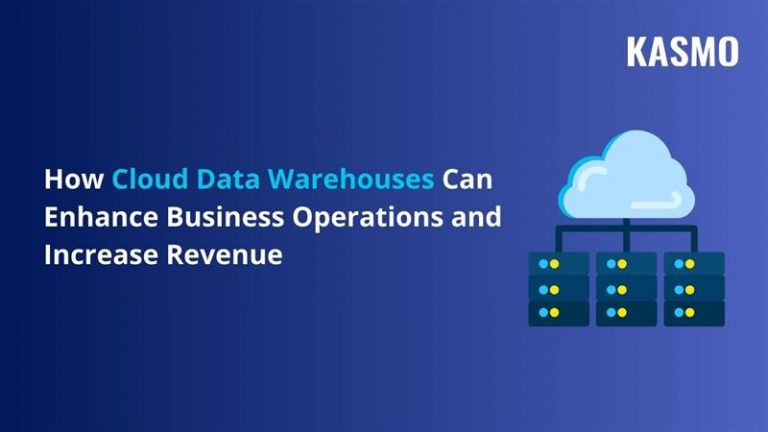Introduction
As organizations continue to expand, they continue to generate vast amounts of data, related to customer interactions, transactional data, and other types of business data. To make informed decisions, businesses need powerful systems and platforms that can store, process, and analyze this data efficiently. Enter cloud data warehouses—innovative solutions that provide scalable, secure, and cost-effective storage and analytics capabilities.
These platforms are designed to handle massive amounts of structured and semi-structured data, which helps companies uncover insights, improve operational efficiencies, and stay competitive .
Despite its many advantages, there are still many organizations that are still hesitant to fully embrace cloud based data warehouse. However, it is to be noted that organizations are right to worry about protecting their data and their customers’ data.
Businesses often lack sufficient knowledge about cloud data warehouse solutions. They are also grappled with the fear of breaking critical data security protocols. Many businesses also show resistance to changes. Additionally, some companies may not fully understand the transformative potential of cloud technologies, while others worry about the technical complexities and costs involved in migration.
There are several misconceptions about cloud data warehouses that have prevented companies from proceeding towards adopting cloud based data warehouses for their business. Let’s have a look at these myths about them.
Misconceptions Which Are Preventing Businesses from Leveraging Cloud Data Warehouses
These myths and misconceptions about cloud data warehouses are the primary factors preventing businesses to use them:
Cloud Data Warehouses Are Too Expensive
Many businesses assume that cloud solutions are more costly than on-premises systems. Sometimes cloud services may come up with higher subscription fees, but rightly so. They help businesses eliminate upfront capital expenses, maintenance, and infrastructure costs. Cloud platforms also offer elastic scalability and cost transparency, making it easier for businesses to control spending while benefiting from greater flexibility and lower overall costs.
Cloud Data Warehouses Are Not Secure Enough
Concerns over data security and compliance are common, especially businesses who have to take care of keeping their goals aligned with previously state or country established regulatory policies. Many businesses believe that cloud data warehouses are unable to provide that level of security to sensitive customer data.
However, most cloud data warehouse solutions meet global standards (e.g., GDPR, HIPAA, PCI) and offer robust encryption, access controls, and automated security patches. Specialized sovereign clouds also address industry-specific regulatory requirements, making cloud solutions highly secure.
Cloud Migrations Are Too Complex
Migrating to the cloud is often perceived as a highly complex task. However, a hybrid approach to migrate data from on–premise to cloud based data warehouses, allows businesses to migrate gradually, keeping certain workloads on-premises while transitioning others to the cloud. This reduces disruption and allows for a smoother, more controlled migration process.
Cloud Data Warehouses Lack Flexibility
Some believe cloud solutions are too rigid. However, modern cloud platforms offer customization, support for open-source integrations, and the ability to run various workloads, including advanced analytics and AI. These warehouses provide greater flexibility and automation, improving efficiency without sacrificing control.
Cloud Data Warehouses Are Too Complex for Non-Technical Teams
Cloud data warehouses are often seen as requiring deep technical expertise. In fact, they come with user-friendly interfaces and self-service capabilities, enabling non-technical teams to access and analyze data easily. BI tools and automation also help businesses to simplify the process of deploying these warehouses.
Cloud Data Warehouses Limit Control Over Data
There’s a misconception that cloud solutions offer less control. Cloud platforms provide advanced monitoring, customizable SLAs, and auto-scaling, which helps businesses retain control over performance and data management while benefiting from improved reliability and disaster recovery options.
Cloud Data Warehouses Are Only for Large Enterprises
Many small businesses believe cloud data warehouses are too complex or expensive for them. However, cloud platforms offer affordable pricing and managed services, making them accessible to businesses of all sizes. Cloud solutions allow smaller companies to scale and innovate without significant upfront investment.
How Snowflake Debunks These Myths About Cloud Data Warehouses?
Snowflake, a powerful cloud-based data warehouse, is designed to challenge and dispel the common misconceptions surrounding cloud data warehouse technology. Let’s explore how Snowflake addresses these concerns:
Cost-Effective and Scalable
With Snowflake’s unique pay-per-use pricing model, it allows businesses to scale resources up or down as needed, avoiding unnecessary costs. The platform’s ability to scale seamlessly ensures that businesses can handle fluctuating workloads without compromising performance.
Enhanced Security and Compliance
Snowflake employs advanced security measures, including encryption, access controls, and threat detection, to safeguard sensitive data. Additionally, this platform adheres to industry standards like SOC 2 Type II, HIPAA, and GDPR, providing assurance to companies who need to follow strict regulatory protocols.
Simplified Migration and Integration
Snowflake offers a streamlined migration process, allowing businesses to move data from various sources to the cloud efficiently. It also provides flexibility to businesses by seamlessly integrating with a wide range of data sources, including databases, data lakes, and cloud applications.
Improved Business Performance
Snowflake can handle diverse workloads, from data warehousing to data lakes and real-time analytics. Snowflake’s unique architecture delivers exceptional query performance and low latency, enabling businesses to derive insights faster.
User-Friendly and Accessible
With its self-service analytics, Snowflake provides a user-friendly interface that empowers business users to access and analyze data without requiring extensive technical expertise. Its diverse collaboration tools foster collaboration among teams, enabling them to share insights and make data-driven decisions.
Complete Control and Visibility
Snowflake offers granular control over data access, ensuring that only authorized users can view and manipulate sensitive information. It also provides real-time monitoring and analytics, allowing businesses to track performance and identify potential issues.



